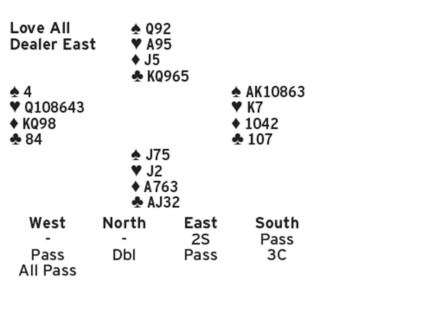Early in the play declarer has the advantage of knowing his exact assets. He may be able to deceive defenders before they have the chance to exchange information by signalling.
 This deal, from the British Simultaneous Pairs, illustrates a common deceptive manoeuvre.
This deal, from the British Simultaneous Pairs, illustrates a common deceptive manoeuvre.
East opened a weak 2![]() , passed round to North, whose double would not meet with universal approval. South’s 3
, passed round to North, whose double would not meet with universal approval. South’s 3![]() showed some values (2NT would be lebensohl with a weak hand). West led partner’s suit, East won the king, and declarer dropped the jack. This looks a bit silly, since he now has three natural spade losers, but costs nothing if East is about to give partner a ruff. East knew that partner’s
showed some values (2NT would be lebensohl with a weak hand). West led partner’s suit, East won the king, and declarer dropped the jack. This looks a bit silly, since he now has three natural spade losers, but costs nothing if East is about to give partner a ruff. East knew that partner’s ![]() 4, the lowest outstanding spade, might be a singleton, but with control of the spade suit he thought it safe to switch to a diamond, taken with the ace. Declarer drew trump in two rounds and played ace and a heart. East won the king and led a diamond to the queen.
4, the lowest outstanding spade, might be a singleton, but with control of the spade suit he thought it safe to switch to a diamond, taken with the ace. Declarer drew trump in two rounds and played ace and a heart. East won the king and led a diamond to the queen.
A heart from West beats the contract, but he led another diamond, ruffed in dummy. Declarer ruffed dummy’s last heart and played his last diamond, discarding a spade from dummy as West took the trick. The loser-on-loser play forced West to lead a heart. Declarer discarded dummy’s last spade while ruffing in hand, making nine tricks.


